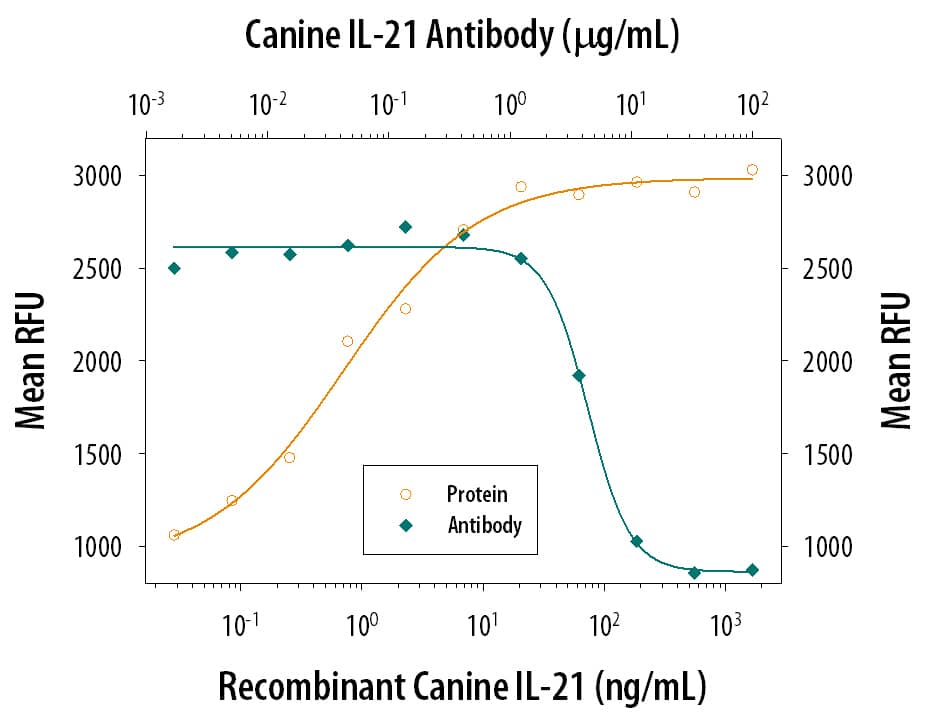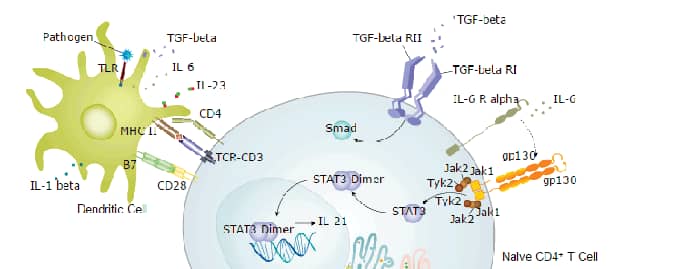Canine IL-21 Antibody Summary
His18-Ser146
Accession # NP_001003347
Applications
Please Note: Optimal dilutions should be determined by each laboratory for each application. General Protocols are available in the Technical Information section on our website.
Scientific Data
 View Larger
View Larger
Cell Proliferation Induced by IL‑21 and Neutralization by Canine IL‑21 Antibody. Recombinant Canine IL-21 (Catalog # 5849-ML) induces proliferation in the N1186 human T cell line in a dose-dependent manner (orange line). Proliferation elicited by Recombinant Canine IL-21 (10 ng/mL) is neutralized (green line) by increasing concentrations of Sheep Anti-Canine IL-21 Antigen Affinity-purified Polyclonal Antibody (Catalog # AF5849). The ND50 is typically 2-10 µg/mL.
Preparation and Storage
- 12 months from date of receipt, -20 to -70 °C as supplied.
- 1 month, 2 to 8 °C under sterile conditions after reconstitution.
- 6 months, -20 to -70 °C under sterile conditions after reconstitution.
Background: IL-21
Interleukin-21 (IL-21) is a 14 kDa (predicted) four-helix-bundle cytokine and member of the IL-15/IL-21 family. It is made by activated CD4+ T cells, activated NKT cells, T helper (Th) cells, and Th17 cells (1‑5). Canine IL-21 is synthesized as a 146 amino acid (aa) precursor that contains a 17 aa signal sequence and a 129 aa mature chain. Mature canine IL-21 is 86%, 73%, 66%, and 64% aa identical to mature bovine, human, mouse and rat IL-21, respectively. IL-21 binds to a heterodimeric receptor, which is formed by the common gamma -chain subunit (CD134), shared with IL-2, IL-4, IL-7, IL-9, IL-13, and IL-15 receptors, and its own receptor, IL‑21 R, a member of the class I cytokine receptor family (1‑2). IL-21 R is expressed on a variety of immune cells, including B cells, T cells, dendritic cells, and NK cells, as well as non-immune cells, such as fibroblasts, epithelial cells, and endothelial cells (1‑2, 5). Binding of IL-21 to its receptor leads to the activation of members of the JAK-family protein tyrosine kinases, JAK1 and JAK3, and signal transducer and activator of transcription (Stat) molecules (1). IL-21 regulates activation, proliferation, and survival of both CD4+ T cells and B cells, the functional activity of CD8+ T cells and NK cells, and limits the differentiation of inducible regulatory T cells and counteracts their suppressive properties on effector T cells (1, 5‑6). IL-21 also negatively regulates the maturation and function of dendritic cells (1, 5‑6). IL‑21 also plays a role in many inflammatory and autoimmune diseases, such as Crohn’s disease, Helicobacter pylori‑related gastritis, celiac disease, type I diabetes mellitus, psoriasis, rheumatoid arthritis, and systemic lupus erythematosus (1). IL‑21 is also involved in controlling chronic viral infections (7).
- Monteleone, G. et al. (2009) Cytokine Growth Factor Rev. 20:185.
- Parrish-Novak, J. et al. (2000) Nature 408:57.
- Coquet, J.M. et al. (2007) J. Immunol.178:2827.
- Vogelzang, A. et al. (2008) Immunity 29:127.
- Monteleone, G. et al. (2008) Trends Immunol. 29:290.
- Spolski, R. et al. (2008) Curr. Opin. Immunol. 20:295.
- Yi, J.S. et al. (2009) Science 324:1572.
Product Datasheets
FAQs
No product specific FAQs exist for this product, however you may
View all Antibody FAQsReviews for Canine IL-21 Antibody
There are currently no reviews for this product. Be the first to review Canine IL-21 Antibody and earn rewards!
Have you used Canine IL-21 Antibody?
Submit a review and receive an Amazon gift card.
$25/€18/£15/$25CAN/¥75 Yuan/¥2500 Yen for a review with an image
$10/€7/£6/$10 CAD/¥70 Yuan/¥1110 Yen for a review without an image




